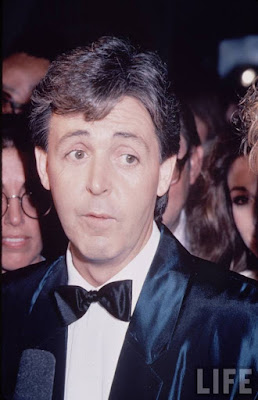Being Boss Suits Paul McCartney
By Albert Watson
Reading Evening Post
December 4, 1984
Paul McCartney likes being the boss, but the people around him haven't always taken kindly to him in that role. In his plush office high above Soho Square in London, in the shadow of his desk and his 50s style jukebox, the 42-year-old former Beatle talked about the personal problems he has had when he finds himself in positions of authority.
"When the Beatles had virtually stopped working in 1968," he said, "it was I who got the others together and suggested our last film, Let It Be. The others got angry with me for pushing them around. But if somebody hadn't taken charge, we wouldn't have done anything. And I hate not doing anything.
"Their irritation with me shows in the film, I think. But at one point, I took what they were saying to heart and stopped pushing them. Then they realized that nothing was happening. So they asked me to take charge again. When I did, it got their backs up again."
Paul was the undoubted boss of his new film, Give My Regards to Broad Street; it was his idea. He wrote the script and all the songs and plays the starring role. He also chose his co-stars, including his old mate, Ringo Starr, and both their wives.
"But it wasn't a McCartney ego trip," he insisted. "The director and the other actors changed the script sometimes. I bowed to other people's technical knowledge quite a lot."
The film has generally had a poor response from the critics and from American audiences. But whatever its shortcomings, it features some of McCartney's best songs in impressive production numbers and shows yet again that his singing voice now is better than ever. The songs, all newly recorded for the film, date back to the Beatle days and include "Yesterday," "Eleanor Rigby," and "For No One."
McCartney admits that nostalgia is at last becoming a part of his life. "Well, at 42 it's bound to, isn't it?" he says. "It's surprising that I've avoided it for so long, really, but now I like looking back to the songs of Buddy Holly (the publishing rights of which he now owns) and the Rupert the Bear strip cartoons." He is planning a Rupert feature film, and has already produced a short which will be shown in cinemas with Broad Street.
He, therefore, doesn't mind talking about the old days, even revealing a few of the wounds he sustained back then. "When the Beatles first broke up in 1970, I got quite depressed," he said. "I could understand what it must be like for unemployed people. I began really to believe that I was useless, that all my success in the past had been a fluke, and that what the critics were saying about the early days of Wings was true.
"It was Linda (his wife) who helped me through that time by assuring me that I wasn't as bad as the worst reviews were making me out. It didn't help that at that time John was slagging me off in interviews. I was tempted to rise to the bait and hit back, but thank the good Lord, I didn't. A Lennon-McCartney battle would have been a field day for the press."
He is a passionate advocate of family life these days, to the extent that he never likes to be apart from Linda and their four children a minute longer than necessary. "I think the only time I've been apart from Linda for a night," he said, "was when I was busted for having marijuana in Japan. I'll drive for hours rather than spend the night away from home. And I still believe Linda has a good singing voice," he said loyally.
The Lennon-McCartney riff never healed completely, but McCartney has stayed on good terms with the other Beatles, hence Ringo's part in the film. "I do know him quite well, you know," said Paul dryly.
But I wondered why that highly successful film producer, George Harrison, wasn't involved in the Broad Street project. "I thought several times about taking the project to George's company, Handmade Films", said Paul, "but to be honest, I couldn't face the possibility that George might not like it and turn it down. I can face many things, but I don't think I could have taken that."
Paul McCartney still wants to be loved. For all his fame, success, and money, he is still the musician who has dealt with the press long after the other Beatles have stopped giving interviews. He likes to be seen as Mr. Nice Guy, and he's still sensitive to criticism. You can tell that from his frequent insistence that he isn't.
"I used to be defensive about the fact that I write so many love songs," he said, "but I'm not anymore. Love is a universal thing. Most people want to be loved and feel secure in a family. The usual McCartney satire involves me blurbling on about home and family and kids and Father Christmas, to the sounds of bagpipes, but I don't care. The critics don't know everything. Do they?"


No comments:
Post a Comment